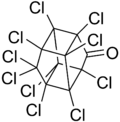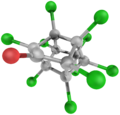- Kepone
-
Kepone 
 1,1a,3,3a,4,5,5,5a,5b,6-Decachlorooctahydro-2H-1,3,4-(methanetriyl)cyclobuta[cd]pentalen-2-oneOther namesChlordecone
1,1a,3,3a,4,5,5,5a,5b,6-Decachlorooctahydro-2H-1,3,4-(methanetriyl)cyclobuta[cd]pentalen-2-oneOther namesChlordecone
Clordecone
MerexIdentifiers CAS number 143-50-0 
PubChem 299 ChemSpider 293 
UNII RG5XJ88UDF 
KEGG C01792 
ChEBI CHEBI:16548 
ChEMBL CHEMBL462576 
Jmol-3D images Image 1 - ClC54C(=O)C1(Cl)C2(Cl)C5(Cl)C3(Cl)C4(Cl)C1(Cl)C2(Cl)C3(Cl)Cl
Properties Molecular formula C10Cl10O Molar mass 490.64 g mol−1 Density 1.6 g/cm3  (verify) (what is:
(verify) (what is:  /
/ ?)
?)
Except where noted otherwise, data are given for materials in their standard state (at 25 °C, 100 kPa)Infobox references Kepone, also known as chlordecone, is a carcinogenic[1] insecticide related to mirex, used between 1966 and 1975 in the USA for ant and roach baits.
Contents
Chemistry and toxicology
Chemically, kepone is a chlorinated polycyclic ketone insecticide and fungicide with the chemical formula C10Cl10O. The dry powder is readily absorbed through the skin and respiratory tract. Some unprotected production workers exposed to kepone powder suffered tremors, jerky eye movements, memory loss, headaches, slurred speech, unsteadiness, lack of coordination, loss of weight, rash, enlarged liver, decreased libido, sterility, chest pain, arthralgia, and the increased risk of developing cancer.[citation needed] Kepone persists in the environment, with a half-life of about 30 years.
History
Kepone was produced by Allied Signal Company in Hopewell, Virginia and caused a nationwide pollution controversy due to improper handling and dumping of the substance into the nearby James River.[2] In the United States, its use was banned in 1975. In 2009, kepone was included in the Stockholm Convention on persistent organic pollutants, which bans its production and use worldwide.[3]
In July 2003, a Richmond Magazine article chronicled the effects on Allied Signal employees and described how Dan Rather and CBS's 60 Minutes brought nationwide attention to the problem.[4]
Due to the pollution scare, many businesses and restaurants along the river suffered, and then-Governor Mills Godwin Jr. shut down the James River to fishing from Richmond to the Chesapeake Bay.
French Antilles
The French island of Martinique is heavily contaminated with kepone,[5] following years of unrestricted (including spray planes) use on banana plantations. Despite a 1990 ban of the substance by France, the island was, after intensive lobbying by the economically powerful Béké community, allowed to continue using kepone until 1993, under the since disputed argument that no alternative pesticide was available. Similarly, the nearby island of Guadeloupe is also contaminated, but to a lesser extent. Since 2003, the local authorities restricted cultivation of crops because the soil has been seriously contaminated by kepone. That may correlate with the fact that Guadeloupe has one of the highest prostate cancer rates in the world.[6]
In popular culture
- Kepone was the name of an American indie rock band from Richmond, Virginia. Formed in 1991, the band's name is derived from the kepone crisis that occurred in the Richmond area in the 1970s. It was originally formed as a sideproject of Michael Bishop, ex-bassist of GWAR.
- The Dead Kennedys recorded a song named "Kepone Factory", a satirical look at the controversy surrounding Allied Signal and their negligence regarding employee safety, for their 1981 album In God We Trust, Inc.. The song was written in 1978, originally titled "Kepone Kids", and was demoed and performed live despite not appearing on any recordings until 1981.
- A history of kepone incidents is featured in the book Who's Poisoning America?: Corporate Polluters and Their Victims in the Chemical Age by Ralph Nader.
References
- ^ chemical description
- ^ Chesapeake bay.net
- ^ Miroslav Šuta: Stockholmská úmluva: Tucet špinavců dostal 9 nových parťáků, respekt.cz, 10.5.2009
- ^ richmond magazine
- ^ French Documentary
- ^ European Journal, Deutsche Welle, 26 May, 2010.[1]
External links
- Terradaily: Pesticide blamed for 'health disaster' in French Caribbean
- EPA releases a Toxicological Review of Kepone (External Review Draft) for public comment - 01/2008
Categories:- Carcinogens
- Ketones
- Organochloride insecticides
- James River (Virginia)
- Endocrine disruptors
- IARC Group 2B carcinogens
Wikimedia Foundation. 2010.
